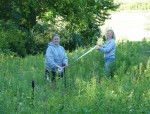Graduate students at the Kellogg Biological Station (KBS) Long Term Ecological Research (LTER) site are working with K-12 science teachers and students to plant the seeds for the “BEST” (BioEnergy Sustainability) Schoolyard Research Network. The network involves about 300 research plots in 22 schools in 11 districts located in five counties in southwest Michigan. The research plots are designed to mimic long-term, collaborative research at KBS and the Great Lakes Bioenergy Research Center (GLBRC). Project faculty, staff, graduate students, and teachers are collaborating on experimental design, research protocols, and curriculum development. These collaborative efforts are creating authentic research experiences for our K-12 partner teachers and students, who are carrying out actual field research.
The project is supported by a GK-12 (Graduate STEM Fellows in K-12 Education) grant from the National Science Foundation’s (NSF) Division of Graduate Education. GK-12 programs are designed to impart to graduate students in the sciences the skills necessary to pursue a professional career in science. Through interactions with teachers in K-12 schools, graduate students are expected to improve communication and teaching skills while enriching science instruction in K-12 schools. Working in partnership with the GLBRC and the NSF’s Math and Science Partnership for Culturally Relevant Ecology, the GK-12 project thus supports KBS’s own K-12 initiative.
For more information on the “BEST” Project, please contact program director Tom Getty (getty@msu.edu) or program manager Robin Tinghitella (hibbsr@msu.edu).
Sara Parr Syswerda is the Kellogg Biological Station K-12 Partnership Coordinator

 Enlarge this image
Enlarge this image